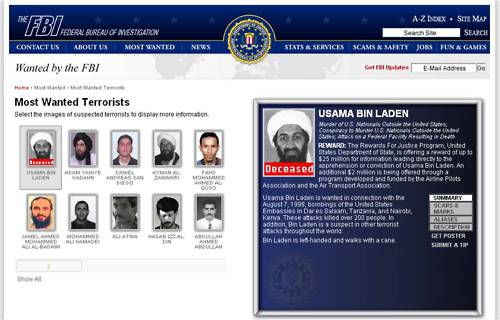“His demise should be welcomed by all who believe in peace and human dignity.”
~President Barack Obama
“I’ve never wished a man dead, but I have read some obituaries with great pleasure.” ~Mark Twain
“Do not gloat when your enemy falls; when they stumble, do not let your heart rejoice, or the LORD will see and disapprove and turn his wrath away from them.†~Proverbs 24: 17-18
I’ve seen all of these quotes on Twitter in the past 12 hours in light of Osama bin Laden’s death. Since he was shot by US Navy Seals when he refused to surrender, I can’t call it murder or an assassination, even though there was almost no other way a Special Ops mission against the most wanted man in the world could have ended.
Death is the best term, and I feel a tinge of guilt for that involuntary fist pump I yielded when I heard the news. Rejoicing in death feels icky, even when the dead person was among the top five on my list of specific people and groups of people I think the world would be better without.
Yet I take issue with Christians thumping through the Twitosphere with Proverbs 24:17-18. Yes, you can find passages in the Bible that call for magnanimous winning, but you can also find plenty that call for justice (like Psalm 7 and Psalm 9). We look for God’s wrath, judgment and vengeance in tornadoes, floods and earthquakes, but today’s weather is far more impartial, and the Bible shows justice was dispensed repeatedly through military operations with the goal of genocide. Taking the city of Jericho, that is, “destroy[ing] with the sword every living thing in it—men and women, young and old, cattle, sheep and donkeys,†made Joshua famous and God was with him. The people threw a parade for David after he stomped Goliath. If at any time Israel’s army or the women staying home didn’t rejoice at the fall of their long-time enemies, it’s fair to say it was only because they were too busy taking plunder, setting up camp and burying the dead to have a party.
I remember how I felt on September 11, 2001, when every television and projection screen was turned to live coverage of New York, DC and Pennsylvania. I sat in a classroom with just a few other people, spat out the lunch I had just started to chew and started crying as I watched people jump from a burning World Trade Center. The chalkboard sized projection screen I saw it on made it all the more horrific.
But I didn’t want revenge on that day, and I haven’t on any day since. (I’m sure I would feel differently if I had lost family members or friends that day.) I objected to the war in Iraq, certain it was misplaced aggression or a way to pacify our culture’s most bloodthirsty calls for retribution as President Bush confronted terrorism—a menace he wasn’t prepared to handle. I was sure there was more conspiracy to the attacks and subsequent wars than we would ever know and that we couldn’t kill our way out of it.
But as with any case in which wrongdoing occurs, I also wanted to see justice done, but I didn’t know how that could be accomplished. Our criminal justice system, unique and impartial as it was created to be, sometimes is impractical, always is uncertain and often doesn’t produce the very thing it attempts to distribute. Criminals bargain for a lighter sentence. Dead victims don’t rise from the grave, and survivors don’t return to how they were before the crime that changed their lives occurred. (And this assumes the guilty are caught and the innocent are not falsely accused or wrongly targeted.) Our system can leave us hungry for the sense of balance and fairness that our humanity demands. Outside of the system, we can have special operations and wars, and we take comfort in the belief that wars’ atrocities are a justified part of keeping us safe.
Bin Laden’s death appeals to my humanity, to the belief that the bad guys still lose and that you can’t run from what’s coming to you forever. I think I express the “muted relief†David Sirota has deemed appropriate for the occasion. I’m reflective, and I cried last night as I listened to the President’s speech and remembered 9/11—the day and the subsequent heroism and unity that made me proud to be an American.
I’m proud again of the US Navy Seals’ courage and precision. (And I must say I’m outright gleeful that this happened not just under President Obama’s watch, but under his direct order.) And while I’m not chanting, “USA! USA!†at baseball games or outside the White House, I welcome back that feeling of unity we usually only get to feel when tragedies like 9/11 and deadly tornadoes strike.
(Or is that latter tragedy really vengeance?)

